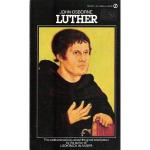|
This section contains 626 words (approx. 2 pages at 400 words per page) |

|
Epic Theater
Most critics agreed that Luther aimed at being epic drama along the lines of the work of German playwright Bertolt Brecht. Epic theater is a form of drama that presents a series of loosely connected scenes. Often, a narrator figure will address the audience with analysis or argument. As practiced by Brecht, epic theater sought to use "alienating" effects to cause the audience to think objectively, not emotionally, about the play and its characters. In technique, Luther shows a strong Brechtian influence, notably, that of his play The Life of Galileo. Like Brecht's drama, Luther is a series of short scenes, most of which could function as stand-alone units. The stage decorations, which Osborne clearly describes, are evocative and imbued with symbolism and iconography. A choral figure, in this case the Knight, announces the time and setting of each scene and narrates background details particularly concerning Luther's...
|
This section contains 626 words (approx. 2 pages at 400 words per page) |

|




